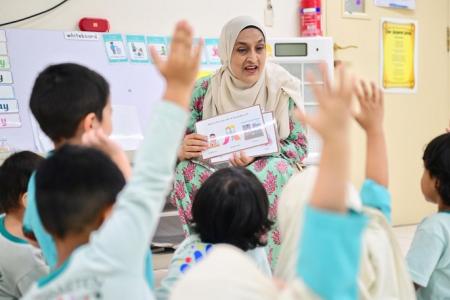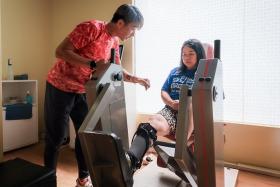New programme empowers stroke survivors to take charge of recovery
Kindergarten teacher Reema Bhatti was getting her 30 charges from the Al-Istiqamah Mosque Kindergarten ready for an excursion in May when started perspiring profusely and was slurring.
Her colleagues noticed it and informed the kindergarten’s principal, who insisted she rush directly to the hospital. Fortunately, she made it in time.
Today, the 53-year-old is back at work after having spent six weeks recovering. Happy that she is safe, her colleagues now rally around her.
“They buzz around me to make sure I am okay,” said Madam Bhatti. “Some of them took over my duties of rushing around, changing diapers for the three- and four-year-olds. My principal even monitors the number of times I drink water.”
Just such support is what the new initiative, called Reintegration for Stroke community Endeavour (Rise), aims to do for up to 1,000 patients with mild to moderate stroke and their caregivers.
The initiative will “facilitate community reintegration and improve their overall well-being”, said Senior Minister of State for Health Janil Puthucheary, who was speaking at the launch of Rise, held at the 20th Singapore International Stroke Conference in the Academia at the Singapore General Hospital (SGH) campus on Oct 4.
Temasek Foundation will commit close to $1.4million for the three-year project and the programme is expected to be rolled out at both SGH and Tan Tock Seng Hospital in 2025.
“Rise will consolidate and enhance existing resources and partnerships in post-stroke care to provide comprehensive support throughout the rehabilitation process, focusing on three key areas,” Dr Janil said.
Firstly, it will improve care coordination and support for stroke survivors after they leave the hospital by following up on screening for common stroke-related issues such as spasticity, incontinence and dementia. It will also provide patient-specific advice on medication compliance, healthy lifestyle changes, and guided individualised care plans.
Secondly, for stroke caregivers, Rise will implement a structured training programme for stroke caregivers.
Thirdly, it will introduce the STroke Empowerment Programme or Step to help survivors take charge of their recovery by improving their function and quality of life.
Stroke is the fourth cause of death and the seventh cause of hospitalisation in Singapore, with one in four persons likely to suffer from it in their lifetime.
With Singapore’s rapidly ageing population, the incidence of stroke rises. While the number of stroke episodes increased by almost 58 per cent from 6,142 in 2011 to 9,680 episodes in 2021, not everyone suffers massive strokes.
Neurologist Deidre Anne de Silva, an associate professor who is the lead of Rise, said stroke is something that happens suddenly and no one is prepared.
“We envisage what life should be and what it may be in the next few years, but then this hits you suddenly, and your family or yourself may not be ready for it at all. People then have to adjust and that adjustment takes time. It takes a lot of different individuals – people who are caring for you physically, also people who may be helping you emotionally,” she said.
According to Prof de Silva, who is also a senior consultant with the Department of Neurology at the National Neuroscience Institute, Rise complements the ongoing stroke care services that are already available, but it “really focuses on the transition of care from a hospital setting to the community, which is often a very difficult journey for stroke survivors”.
“(It focuses) on helping them control their risk factors and reduce the risk of subsequent strokes happening, as well as subsequent hospitalisation. It also helps them navigate the sometimes rather complex community that we have.
“(There are) many different resources, and one can get quite confused if you’re not familiar with it. So they will help them individually with their own specific needs,” she said.
There will be a Stroke Liaison Officer serving as a single point of contact to follow up with an individualised care plan and coordinate with other community services for stroke survivors, and escalate cases to medical teams if needed.
“The plan is to have three Stroke Liaison Officers, and we are going to train laypersons. We want to have individuals, and they could even be people who have had stroke before themselves, so they can interact with stroke survivors based on their own personal life experiences.
“We aim to target 1,000 stroke survivors and 1,000 caregivers as part of this pilot programme. We will be collecting the data to look, so that we can have evidence that, I am sure, is going to benefit individuals. And with that, we hope to scale it up to our wider community,” Prof de Silva said.
Get The New Paper on your phone with the free TNP app. Download from the Apple App Store or Google Play Store now


